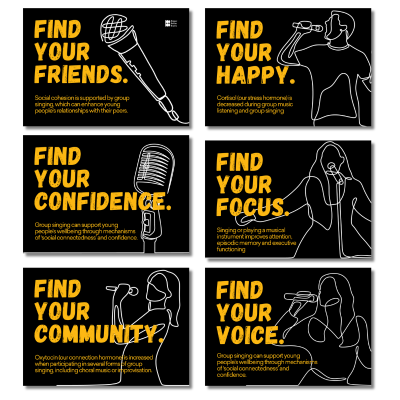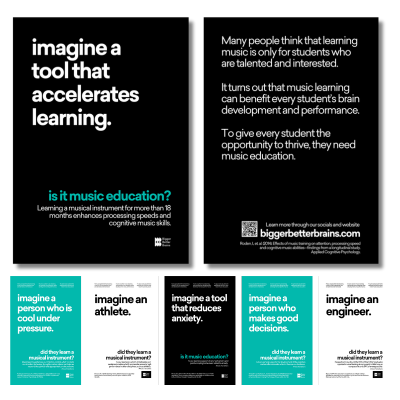
Research Updates

Here at Bigger Better Brains we believe that through educating yourself, you can then educate and affect positive change in your community.
With all of the research in the field of neuromusical science, our BBB Research section serves as a content hub for you. We regularly share findings and break down the latest research to educate and inspire discussion. We hope you enjoy this page on our website and share BBB news with your colleagues, parents and students.
- Advocacy
- Ageing
- Aging
- Attention
- Auditory Processing
- Cognitive Health
- Communication
- Community
- Dyslexia, Autism & ADHD
- Early Childhood
- Executive Function
- Fireworks
- Impulse Control
- Language & Literacy
- Memory
- Music Learning
- Music Listening
- Neural Development
- Parents
- Personality
- Productivity
- Prosocial Behaviour
- Prosody
- Reading
- Rehabilitation
- Research Bites
- Research Methods
- Research Quick Reads
- Reward
- Singing
- Social Skills
- Video
- Wellbeing & Therapy
- Working Memory
Music’s Secret Genetic Power: What It Means for Language and Learning
A groundbreaking study in Nature Human Behaviour has revealed a fascinating genetic connection between musical rhythm skills and language-related traits, including dyslexia.
How Music Primes the Brain for Learning
This article delves into the transformative impact of music education, particularly for underserved students, and a strategic tool for addressing academic challenges, boosting attendance, language skills, and social integration.
New neuroscience research upends traditional theories of early language learning in babies
New research challenges traditional theories of infant language acquisition, suggesting that babies primarily learn language through rhythmic rather than phonetic information in their initial months.
Music is the Jackpot!
This video contains excerpts from an ARTSpeaks event held on November 8, 2021. In this video, neurobiologist Nina Kraus explores the impact that music learning has on young students in the areas of reading skills, sound processing, language abilities, and more.
Music learning and literacy
“It’s about how we spend the money”. That was the catch cry of a number of politicians this week when the preliminary results from NAPLAN were released. Senator Birmingham was referring to the disappointing return on their investment in education. So Senator, what are we spending the money on?
Does music training improve a child’s maths and reading skills?
A great article from Dr Nina Kraus, one of the leading researchers in the neural encoding of speech and music.
Music and Language
Music and language: two sides of the human communication coin.
How is music related to English language reading?
This study has compared musical training with the visual aspect of reading languages. The most interesting thing about the study design is that they have compared Chinese language reading and English language reading.
Getting to the bottom of music and reading
This study is important because it is trying to get to the bottom of the neural development of the auditory and motor networks. It is, however, building on the research from musically trained children and reading.
Do monkeys like music?
This study explored if humans and monkeys process music, specifically pitch processing, the same way. Why would they want to research this? The reason is music, as we know it, is a unique creation by humans.
Boost your child's reading skills in just 10 minutes a week
10 minutes of music learning a week for 10 weeks can improve reading skills for poor readers.
Rhythm and Reading
This brand new study with beginner readers (aged 5-7) found a whole swag of connections, concluding that “rhythm skills and literacy call on overlapping neural mechanisms, supporting the idea that rhythm training may boost literacy in part by engaging sensory‐motor systems”.
Is there a new way to think about language (and music) development?
The capacity for language is distinctly human. It allows us to communicate, learn things, create culture, and think better. Because of its complexity, scientists have long struggled to understand the neurobiology of language.
Can second language ability be predicted through music?
While musicality and working memory are mostly treated as clear predictors of foreign language learning ability, the relationship between brain morphology and language aptitude is far from obvious.
Rhythm is a multidimensional skill set
To keep a beat, our brains have to get the auditory and motor cortices to first synchronise and then maintain that synchronisation as small things change in the music. To maintain a rhythm, our brains need to do all of that plus constantly monitor how the rhythm is fitting into the beat. It looks easy, however, it is very hard.
Music learning can change the educational life for disadvantaged students
Music has been used as an intervention around the world to help students, and inevitably whole communities, who are living in challenging circumstances.
Little ears are listening: How babies learn to talk before they’re even born
This article is packed with fantastic research from the MARCS Institute in Sydney, Australia. It is vital to study the first developmental steps in all areas of life.
Music learning increases pre-reading skills and vocabulary
The results of this study found that early childhood music training can lead to associated improvements in both musical skills and language skills!
Language is music to a baby’s brain
In this study, they found that 9-month-old babies who had one month of exposure to directed music listening improved not only their auditory processing of music but also their language!
Musical play is a must for preschoolers
What is musical play? Is it bashing on an upturned drum in the playground or banging pots and pans on the kitchen floor? Well, it can be both.
Auditory roots of literacy skills
Here is a great article to take along to your next staff meeting or use as a discussion point with other teachers in your school, particularly if it is a primary or elementary school.
Rhythm can predict risk of language disorders
Here is a fascinating new theoretical paper about the relationship between rhythm and language abilities. A theoretical study is one that brings together all the relevant current research and puts forward a theory of, in this case, how two concepts may be connected.
Music sets preschoolers up for success
In a new study, it has been found that preschoolers who have better vocabulary and attention skills are more likely to do better at school. This is not a shocking finding. Early childhood educators have been aware of this connection and indeed school readiness programs focus on building both of these skills.
































